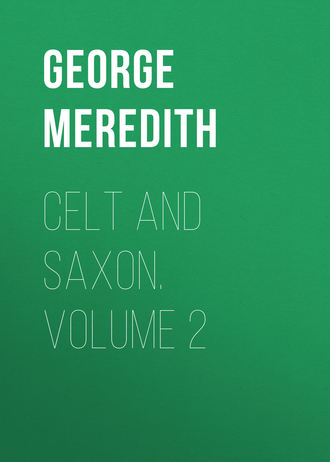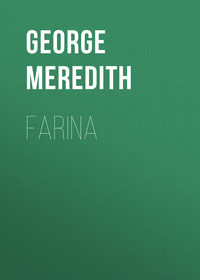
Celt and Saxon. Volume 2
He was caught by it, but he took the close of the introductory section, an allegro con brio, for the end, and she had to hush at him again, and could not resist smiling at her lullaby to the prattler. Patrick smiled in response. Exchanges of smiles upon an early acquaintance between two young people are peeps through the doorway of intimacy. She lost sight of the Jesuit. Under the influence of good music, too, a not unfavourable inclination towards the person sitting beside us and sharing that sweetness, will soften general prejudices—if he was Irish, he was boyishly Irish, not like his inscrutable brother; a better, or hopefuller edition of Captain Con; one with whom something could be done to steady him, direct him, improve him. He might be taught to appreciate Beethoven and work for his fellows. 'Now does not that touch you more deeply than the Italian?' said she, delicately mouthing: 'I, mio tradito amor!'
'Touch, I don't know,' he was honest enough to reply. 'It's you that haven't given it a fair chance I'd like to hear it again. There's a forest on fire in it.'
'There is,' she exclaimed. 'I have often felt it, but never seen it.
You exactly describe it. How true!'
'But any music I could listen to all day and all the night,' said he.
'And be as proud of yourself the next morning?'
Patrick was rather at sea. What could she mean?
Mrs. Adister O'Donnell stepped over to them, with the object of installing Colonel Adister in Patrick's place.
The object was possibly perceived. Mrs. Adister was allowed no time to set the manoeuvre in motion.
'Mr. O'Donnell is a great enthusiast for music, and could listen to it all day and all night, he tells me,' said Miss Mattock. 'Would he not sicken of it in a week, Mrs. Adister?'
'But why should I?' cried Patrick. 'It's a gift of heaven.'
'And, like other gifts of heaven, to the idle it would turn to evil.'
'I can't believe it.'
'Work, and you will believe it.'
'But, Miss Mattock, I want to work; I'm empty-handed. It 's true I want to travel and see a bit of the world to help me in my work by and by. I'm ready to try anything I can do, though.'
'Has it ever struck you that you might try to help the poor?'
'Arthur is really anxious, and only doubts his ability,' said Mrs.
Adister.
'The doubt throws a shadow on the wish,' said Miss Mattock. 'And can one picture Colonel Adister the secretary of a Laundry Institution, receiving directions from Grace and me! We should have to release him long before the six months' term, when we have resolved to incur the expense of a salaried secretary.'
Mrs. Adister turned her head to the colonel, who was then looking down the features of Mrs. Rockney.
Patrick said: 'I'm ready, for a year, Miss Mattock.'
She answered him, half jocosely: 'A whole year of free service? Reflect on what you are undertaking.'
'It's writing and accounts, no worse?'
'Writing and accounts all day, and music in the evening only now and then.'
'I can do it: I will, if you'll have me.'
'Do you hear Mr. O'Donnell, Mrs. Adister?'
Captain Con fluttered up to his wife, and heard the story from Miss
Mattock.
He fancied he saw a thread of good luck for Philip in it. 'Our house could be Patrick's home capitally,' he suggested to his wife. She was not a whit less hospitable, only hinting that she thought the refusal of the post was due to Arthur.
'And if he accepts, imagine him on a stool, my dear madam; he couldn't sit it!'
Miss Mattock laughed. 'No, that is not to be thought of seriously. And with Mr. O'Donnell it would be probationary for the first fortnight or month. Does he know anything about steam?'
'The rudimentary idea,' said Patrick.
'That's good for a beginning,' said the captain; and he added: 'Miss Mattock, I'm proud if one of my family can be reckoned worthy of assisting in your noble work.'
She replied: 'I warn everybody that they shall be taken at their word if they volunteer their services.'
She was bidden to know by the captain that the word of an Irish gentleman was his bond. 'And not later than to-morrow evening I'll land him at your office. Besides, he'll find countrywomen of his among you, and there's that to enliven him. You say they work well, diligently, intelligently.'
She deliberated. 'Yes, on the whole; when they take to their work. Intelligently certainly compared with our English. We do not get the best of them in London. For that matter, we do not get the best of the English—not the women of the north. We have to put up with the rejected of other and better-paying departments of work. It breaks my heart sometimes to see how near they are to doing well, but for such a little want of ballast.'
'If they're Irish,' said Patrick, excited by the breaking of her heart, 'a whisper of cajolery in season is often the secret.'
Captain Con backed him for diplomacy. 'You'll learn he has a head, Miss
Mattock.'
'I am myself naturally blunt, and prefer the straightforward method,' said she.
Patrick nodded. 'But where there's an obstruction in the road, it's permissible to turn a corner.'
'Take 'em in flank when you can't break their centre,' said Con.
'Well, you shall really try whether you can endure the work for a short time if you are in earnest,' Miss Mattock addressed the volunteer.
'But I am,' he said.
'We are too poor at present to refuse the smallest help.'
'And mine is about the smallest.'
'I did not mean that, Mr. O'Donnell.'
'But you'll have me?'
'Gladly.'
Captain Con applauded the final words between them. They had the genial ring, though she accepted the wrong young man for but a shadow of the right sort of engagement.
This being settled, by the sudden combination of enthusiastic Irish impulse and benevolent English scheming, she very considerately resigned herself to Mrs. Adister's lead and submitted herself to a further jolting in the unprogressive conversational coach with Colonel Adister, whose fault as a driver was not in avoiding beaten ways, but whipping wooden horses.
Evidently those two were little adapted to make the journey of life together, though they were remarkably fine likenesses of a pair in the dead midway of the journey, Captain Con reflected, and he could have jumped at the thought of Patrick's cleverness: it was the one bright thing of the evening. There was a clear gain in it somewhere. And if there was none, Jane Mattock was a good soul worth saving. Why not all the benefaction on our side, and a figo for rewards! Devotees or adventurers, he was ready in imagination to see his cousins play the part of either, as the cross-roads offered, the heavens appeared to decree. We turn to the right or the left, and this way we're voluntary drudges, and that way we're lucky dogs; it's all according to the turn, the fate of it. But never forget that old Ireland is weeping!
O never forget that old Ireland is weepingThe bitter salt tears of the mother bereft!He hummed the spontaneous lines. He was accused of singing to himself, and a song was vigorously demanded of him by the ladies.
He shook his head. 'I can't,' he sighed. 'I was plucking the drowned body of a song out of the waters to give it decent burial. And if I sing I shall be charged with casting a firebrand at Mr. Rockney.'
Rockney assured him that he could listen to anything in verse.
'Observe the sneer:—for our verses are smoke,' said Con.
Miss Mattock pressed him to sing.
But he had saddened his mind about old Ireland: the Irish news weighed heavily on him, unrelieved by a tussle with Rockney. If he sang, it would be an Irish song, and he would break down in it, he said; and he hinted at an objection of his wife's to spirited Irish songs of the sort which carry the sons of Erin bounding over the fences of tyranny and the brook of tears. And perhaps Mr. Rockney might hear a tale in verse as hard to bear as he sometimes found Irish prose!—Miss Mattock perceived that his depression was genuine, not less than his desire to please her. 'Then it shall be on another occasion,' she said.
'Oh! on another occasion I'm the lark to the sky, my dear lady.'
Her carriage was announced. She gave Patrick a look, with a smile, for it was to be a curious experiment. He put on the proper gravity of a young man commissioned, without a dimple of a smile. Philip bowed to her stiffly, as we bow to a commanding officer who has insulted us and will hear of it. But for that, Con would have manoeuvred against his wife to send him downstairs at the lady's heels. The fellow was a perfect riddle, hard to read as the zebra lines on the skin of a wild jackass— if Providence intended any meaning when she traced them! and it's a moot point: as it is whether some of our poets have meaning and are not composers of zebra. 'No one knows but them above!' he said aloud, apparently to his wife.
'What can you be signifying?' she asked him. She had deputed Colonel Arthur to conduct Miss Mattock and Miss Barrow to their carriage, and she supposed the sentence might have a mysterious reference to the plan she had formed; therefore it might be a punishable offence. Her small round eyes were wide-open, her head was up and high.
She was easily appeased, too easily.
'The question of rain, madam,' he replied to her repetition of his words.
'I dare say that was what I had in my mind, hearing Mr. Mattock and Mr.
Rockney agree to walk in company to their clubs.'
He proposed to them that they should delay the march on a visit to his cabin near the clouds. They were forced to decline his invitation to the gentle lion's mouth; as did Mr. Rumford, very briskly and thankfully. Mr. Rockney was taken away by Mr. and Mrs. Marbury Dyke. So the party separated, and the Englishmen were together, and the Irishmen together; and hardly a syllable relating to the Englishmen did the Irishmen say, beyond an allusion to an accident to John Mattock's yacht off the Irish west-coast last autumn; but the Irishmen were subjected to some remarks by the Englishmen, wherein their qualities as individuals and specimens of a race were critically and neatly packed. Common sense is necessarily critical in its collision with vapours, and the conscious possessors of an exclusive common sense are called on to deliver a summary verdict, nor is it an unjust one either, if the verdict be taken simply for an estimate of what is presented upon the plain surface of to-day. Irishmen are queer fellows, never satisfied, thirsting for a shindy. Some of them get along pretty well in America. The air of their Ireland intoxicates them. They require the strong hand: fair legislation, but no show of weakness. Once let them imagine you are afraid of them, and they see perfect independence in their grasp. And what would be the spectacle if they were to cut themselves loose from England? The big ship might be inconvenienced by the loss of the tender; the tender would fall adrift on the Atlantic, with pilot and captain at sword and pistol, the crew playing Donnybrook freely. Their cooler heads are shrewd enough to see the folly, but it catches the Irish fancy to rush to the extreme, and we have allowed it to be supposed that it frightens us. There is the capital blunder, fons et origo.
Their leaders now pretend to work upon the Great Scale; they demand everything on the spot upon their own interpretation of equity. Concessions, hazy speeches, and the puling nonsense of our present Government, have encouraged them so far and got us into the mess. Treat them as policemen treat highwaymen: give them the law: and the law must be tightened, like the hold on a rogue by his collar, if they kick at it. Rockney was for sharp measures in repression, fair legislation in due course.
'Fair legislation upon your own interpretation of fair,' said Mattock, whose party opposed Rockney's. 'As to repression, you would have missed that instructive scene this evening at Con O'Donnell's table, if you had done him the kindness to pick up his glove. It 's wisest to let them exhaust their energies upon one another. Hold off, and they're soon at work.'
'What kind of director of a City Company does he make?' said Rockney.
Mattock bethought him that, on the whole, strange to say, Con O'Donnell comported himself decorously as a director, generally speaking on the reasonable side, not without shrewdness: he seemed to be sobered by the money question.
'That wife of his is the salvation of him,' Rockney said, to account for the Captain's shrewdness. 'She manages him cleverly. He knows the length of his line. She's a woman of principle, and barring the marriage, good sense too. His wife keeps him quiet, or we should be hearing of him. Forbery 's a more dangerous man. There's no intentional mischief in Con O'Donnell; it's only effervescence. I saw his game, and declined to uncork him. He talks of a niece of his wife's: have you ever seen her?—married to some Servian or Roumanian prince.'
Mattock answered: 'Yes.'
'Is she such a beauty?'
Again Mattock answered: 'Yes,' after affecting thoughtfulness.
'They seem to marry oddly in that family.'
Mattock let fly a short laugh at the remark, which had the ring of some current phrase. 'They do,' he said.
Next morning Jane Mattock spoke to her brother of her recruit. He entirely trusted to her discretion; the idea of a young Irish secretary was rather comical, nevertheless. He had his joke about it, requesting to have a sight of the secretary's books at the expiry of the week, which was the length of time he granted this ardent volunteer for evaporating and vanishing.
'If it releases poor Grace for a week, it will be useful to us,' Jane said. 'Women are educated so shamefully that we have not yet found one we can rely on as a competent person. And Mr. O'Donnell—did you notice him? I told you I met him a day or two back—seems willing to be of use. It cannot hurt him to try. Grace has too much on her hands.'
'She has a dozen persons.'
'They are zealous when they are led.'
'Beware of letting them suspect that they are led.'
'They are anxious to help the poor if they can discover how.'
'Good men, I don't doubt,' said John Mattock. 'Any proposals from curates recently?'
'Not of late. Captain O'Donnell, the brother of our secretary, is handsomer, but we do not think him so trustworthy. Did you observe him at all?—he sat by me. He has a conspirator's head.'
'What is that?' her brother asked her.
'Only a notion of mine.'
She was directed to furnish a compendious report of the sayings, doings, and behaviour of the Irish secretary in the evening.
'If I find him there,' she said.
Her brother was of opinion that Mr. Patrick O'Donnell would be as good as his word, and might be expected to appear there while the novelty lasted.
CHAPTER XV
THE MATTOCK FAMILY
That evening's report of the demeanour of the young Irish secretary in harness was not so exhilarating as John Mattock had expected, and he inclined to think his sister guilty of casting her protecting veil over the youth. It appeared that Mr. O'Donnell had been studious of his duties, had spoken upon no other topic, had asked pertinent questions, shown no flippancy, indulged in no extravagances. He seemed, Jane said, eager to master details. A certain eagerness of her own in speaking of it sharpened her clear features as if they were cutting through derision. She stated it to propitiate her brother, as it might have done but for the veracious picture of Patrick in the word 'eager,' which pricked the scepticism of a practical man. He locked his mouth, looking at her with a twinkle she refused to notice. 'Determined to master details' he could have accepted. One may be determined to find a needle in a dust-heap; one does not with any stiffness of purpose go at a dust-heap eagerly. Hungry men have eaten husks; they have not betrayed eagerness for such dry stuff. Patrick's voracity after details exhibited a doubtfully genuine appetite, and John deferred his amusement until the termination of the week or month when his dear good Jane would visit the office to behold a vacated seat, or be assailed by the customary proposal. Irishmen were not likely to be far behind curates in besieging an heiress. For that matter, Jane was her own mistress and could very well take care of herself; he had confidence in her wisdom.
He was besides of an unsuspicious and an unexacting temperament. The things he would strongly object to he did not specify to himself because he was untroubled by any forethought of them. Business, political, commercial and marine, left few vacancies in his mind other than for the pleasures he could command and enjoy. He surveyed his England with a ruddy countenance, and saw the country in the reflection. His England saw much of itself in him. Behind each there was more, behind the country a great deal more, than could be displayed by a glass. The salient features wore a resemblance. Prosperity and heartiness; a ready hand on, and over, a full purse; a recognised ability of the second-rate order; a stout hold of patent principles; inherited and embraced, to make the day secure and supply a somniferous pillow for the night; occasional fits of anxiety about affairs, followed by an illuminating conviction that the world is a changing one and our construction not of granite, nevertheless that a justifiable faith in the ship, joined to a constant study of the chart, will pull us through, as it has done before, despite all assaults and underminings of the common enemy and the particular; these, with the humorous indifference of familiarity and constitutional annoyances, excepting when they grew acute and called for drugs, and with friendliness to the race of man of both colours, in the belief that our Creator originally composed in black and white, together with a liking for matters on their present footing in slow motion, partly under his conductorship, were the prominent characteristics of the grandson of the founder of the house, who had built it from a spade.
The story of the building was notorious; popular books for the inciting of young Englishmen to dig to fortune had a place for it among the chapters, where we read of the kind of man, and the means by which the country has executed its later giant strides of advancement. The first John Mattock was a representative of his time; he moved when the country was moving, and in the right direction, finding himself at the auspicious moment upon a line of rail. Elsewhere he would have moved, we may suppose, for the spade-like virtues bear their fruits; persistent and thrifty, solid and square, will fetch some sort of yield out of any soil; but he would not have gone far. The Lord, to whom an old man of a mind totally Hebrew ascribed the plenitude of material success, the Lord and he would have reared a garden in the desert; in proximity to an oasis, still on the sands, against obstacles. An accumulation of upwards of four hundred thousand pounds required, as the moral of the popular books does not sufficiently indicate, a moving country, an ardent sphere, to produce the sum: and since, where so much was done, we are bound to conceive others at work as well as he, it seems to follow that the exemplar outstripping them vastly must have profited by situation at the start, which is a lucky accident; and an accident is an indigestible lump in a moral tale, real though the story be. It was not mentioned in the popular books; nor did those worthy guides to the pursuit of wealth contain any reminder of old John Mattock's dependence upon the conjoint labour of his fellows to push him to his elevation. As little did they think of foretelling a day, generations hence, when the empty heirs of his fellows might prefer a modest claim (confused in statement) to compensation against the estate he bequeathed: for such prophecy as that would have hinted at a tenderness for the mass to the detriment of the individual, and such tenderness as that is an element of our religion, not the drift of our teaching.
He grumbled at the heavy taxation of his estate during life: yearly this oppressed old man paid thousands of pounds to the Government. It was poor encouragement to shoulder and elbow your way from a hovel to a mansion!
He paid the money, dying sour; a splendid example of energy on the road, a forbidding one at the terminus. And here the moral of the popular books turned aside from him to snatch at humanity for an instance of our frailness and dealt in portentous shadows:—we are, it should be known, not the great creatures we assume ourselves to be. Six months before his death he appeared in the garb of a navvy, humbly soliciting employment at his own house-door. There he appealed to the white calves of his footmen for a day's work, upon the plea that he had never been a democrat.
The scene had been described with humanely-moralising pathos in the various books of stories of Men who have come to Fortune, and it had for a length of seasons an annual position in the foremost rank (on the line, facing the door) in our exhibition of the chosen artists, where, as our popular words should do, it struck the spectator's eye and his brain simultaneously with pugilistic force: a reference to the picture in the catalogue furnishing a recapitulation of the incident. 'I've worked a good bit in my time, gentlemen, and I baint done yet':—SEE PROFESSOR SUMMIT'S 'MEN WHO HAVE COME TO FORTUNE.' There is, we perceive at a glance, a contrast in the bowed master of the Mansion applying to his menials for a day's work at the rate of pay to able-bodied men:—which he is not, but the deception is not disingenuous. The contrast flashed with the rapid exchange of two prizefighters in a ring, very popularly. The fustian suit and string below the knee, on the one side, and the purple plush breeches and twinkling airy calves (fascinating his attention as he makes his humble request to his own, these domestic knights) to right and left of the doorway and in front, hit straight out of the canvas. And as quickly as you perceive the contrast you swallow the moral. The dreaded thing is down in a trice, to do what salutary work it may within you. That it passed into the blood of England's middle-class population, and set many heads philosophically shaking, and filled the sails of many a sermon, is known to those who lived in days when Art and the classes patronising our Native Art existed happily upon the terms of venerable School-Dame and studious pupils, before the sickly era displacing Exhibitions full of meaning for tricks of colour, monstrous atmospherical vagaries that teach nothing, strange experiments on the complexion of the human face divine—the feminine hyper-aethereally. Like the first John Mattock, it was formerly of, and yet by dint of sturdy energy, above the people. They learnt from it; they flocked to it thirsting and retired from it thoughtful, with some belief of having drunk of nature in art, as you will see the countless troops of urchins about the one cow of London, in the Great City's Green Park.
A bequest to the nation of the best of these pictures of Old John, by a very old Yorkshire collector, makes it milk for all time, a perpetual contrast, and a rebuke. Compared with the portrait of Jane Mattock in her fiery aureole of hair on the walls of the breakfast-room, it marks that fatal period of degeneracy for us, which our critics of Literature as well as Art are one voice in denouncing, when the complex overwhelms the simple, and excess of signification is attempted, instead of letting plain nature speak her uncorrupted tongue to the contemplative mind. Degeneracy is the critical history of the Arts. Jane's hair was of a reddish gold-inwoven cast that would, in her grandfather's epoch, have shone unambiguously as carrots. The girl of his day thus adorned by Nature, would have been shown wearing her ridiculous crown with some decent sulkiness; and we should not have had her so unsparingly crowned; the truth would have been told in a dexterous concealment—a rope of it wound up for a bed of the tortoise-shell comb behind, and a pair of tight cornucopias at the temples. What does our modern artist do but flare it to right and left, lift it wavily over her forehead, revel in the oriental superabundance, and really seem to swear we shall admire it, against our traditions of the vegetable, as a poetical splendour. The head of the heiress is in a Jovian shower. Marigolds are in her hand. The whole square of canvas is like a meadow on the borders of June. It causes blinking.









